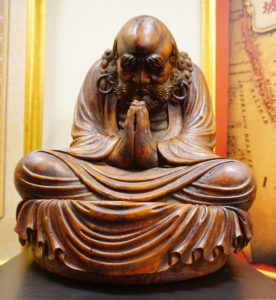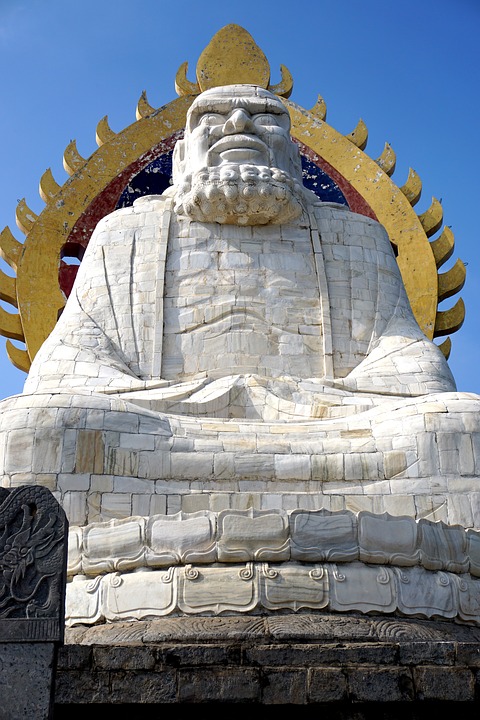Like most of the great men of his time, little verifiable information still exists about the Buddhist monk known as Bodhidharma. His life is shrouded in a haze of legend and half-truths. To try distinguishing between fact and fiction would be a herculean task, and would accomplish nothing. Much like Judaism and Christianity, in which many Bible stories are valued not for their truth or untruth, but for the lessons they convey, Buddhism sees the life of its 28th Patriarch as a source of inspiration, intellectual stimulation, and moral contemplation, rather than a reason to nitpick of biographical details.
What follows is not the life story a historian would give you, and I will not pretend it accurately portrays Bodhidharma’s life. Instead, it shows the man through the lens the modern Buddhist sees him through. I will blend historical reality with legend, and you will see a man who was wise, powerful, and influential. In essence, you will see a man who cast a giant shadow, one so long that it can still be seen today.
Bodhidharma was born into wealth and privilege. He was the son of Brahmins, the religious and political aristocracy of 5th Century India. Much like any child of his social status, he received the best education available to young men, and he took a particular interest in Buddhism. He eventually made the decision to become a monk, thereby formally devoting the rest of his life to the study, teaching, and spreading of the life and works of Buddha.
The young Bodhidharma must have been an impressive scholar, as he quickly rose to the pinnacle of Buddhism’s religious hierarchy. He was apprenticed at an early age to the Patriarch of Buddhism. When his mentor died, Bodhidharma himself ascended to that position.
 The new Patriarch took his obligation to spread the religion very seriously, and his first act was to travel north into China. There he soon met with the Emperor, who posed three questions. “What is the highest meaning of noble truth?” Bodhidharma explained: “There is no noble truth.” Determined to get some sort of straight answer out of the scholar, the Emperor then asked: “Who is it that stands before me?” Bodhidharma, always a humble man, would not brag about the office he held. “I do not know”, he answered. In a final effort to get useful information from Bodhidharma, the Emperor asked what karmic value all of the good deeds he had done throughout his life carried. The answer consisted of one word: “None.”
The new Patriarch took his obligation to spread the religion very seriously, and his first act was to travel north into China. There he soon met with the Emperor, who posed three questions. “What is the highest meaning of noble truth?” Bodhidharma explained: “There is no noble truth.” Determined to get some sort of straight answer out of the scholar, the Emperor then asked: “Who is it that stands before me?” Bodhidharma, always a humble man, would not brag about the office he held. “I do not know”, he answered. In a final effort to get useful information from Bodhidharma, the Emperor asked what karmic value all of the good deeds he had done throughout his life carried. The answer consisted of one word: “None.”
His wisdom, humility, and bravery are never clearer than in this story. Faced with the mightiest man in the world, Bodhidharma gave only honest answers, answers which must surely have inspired rage in the Emperor. The responses he gave showed intelligence and insight, two characteristics that would define him for the rest of his life.
His northward travel continued, and he made a name for himself as a brilliant and focused man. He founded what we now know as Zen Buddhism. The Patriarch was no hypocrite; he practiced Zen as he preached it. One legend tells of how he meditated for nine consecutive years without pause.
This particular story has various conclusions:
In one, he falls asleep after 7 years and cuts off his eyelids so he won’t fall asleep again. In the place where his eyelids hit the cave floor, tea plants spring up. Tea, a drink that contains caffeine, would help drowsy Buddhists meditate.
Another tells of him leaving after nine years and leaving behind a cast iron chest. Contained within the chest was the Yi Jin Jing, the book that would later form the basis for Shaolin martial arts.
A third, and banaler, version states quite simply that he passed away at the end of the ninth year.
Bodhidharma was a great writer and contributed to the most difficult and obscure of all Buddhist texts, the Lankavatara Sutra. He also wrote many of his own works, which remain among the most important down to this day. He was relatively unsuccessful at converting people to Buddhism, but many of the sermons he gave are thought to show greater insight and depth of understanding than any others since his time.
All men, no matter how great, must die eventually. But only the greatest among them remain as much a legend in dying as in living. Bodhidharma is said to been buried during the 6th Century A.D., but to have risen from his tomb to return home to his native India.





